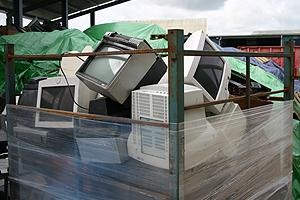later post | index | earlier post
What is commercial waste?
Tuesday, 12 September 2017

Commercial or business waste is derived from a business premises that’s used predominantly for trade, sport, entertainment or recreation. It does not encapsulate industrial or household waste; only waste created from any type of commercial activity.
Commercial waste also incorporates refuse created following gardening and building work on a residential property, providing the individual undertaking the work is not the homeowner.
If the waste you create derives from one or more of the following processes, you have a legal duty to ensure it is disposed of in a legal manner:
- Waste from rented properties encountered by a landlord or their letting agent.
- Waste derived at residential properties by contractors and builders.
- Waste collected from a residential property by a commercial organisation in exchange for payment.
- Waste from a residential property brought to a recycling site by anyone other than the homeowner.
- Waste from home-based business activities such as hairdressing, accountancy, woodwork etc.
- Any additional commercial waste defined by the Controlled Waste Regulations 2012
As a business owner, it is your legal responsibility to ensure all your commercial waste is handled and disposed of properly. You are required to comply with the Duty of Care legislation which demonstrates how commercial or business waste should be stored, transported, disposed of and recorded.
If you wish to dispose of your own commercial or business waste you are also required to register as a waste carrier wherever you live in the UK. If someone else transports your commercial waste it’s important to make sure of the following:
- The individual or business involved is authorised to carry your waste. All companies licenced to carry or accept commercial waste are listed on the Environment Agency’s Public Registers. At ASM Metal Recycling you will find us on the Waste Carriers and Brokers Public Register for England.
- Insist that all commercial waste is transported to a licensed or exempt recycling site.
- Supply a waste transfer note to your carrier, including a complete description of the waste, signed by both your business and the waste carrier.
- Sign the declaration on the transfer note which acknowledges that you have applied the waste hierarchy to your commercial waste.
In terms of commercial waste storage, the Duty of Care legislation states you must store it securely on-site in containers that protect it from being contaminated with the wider environment or being disturbed by animals.
Aside from storing your commercial waste correctly, you also need a business you can rely on to collect and transport your potentially hazardous substances to an approved site for disposal or recycling. From corroding electronics to a pile of sharp scrap metal which, if left unattended, could harm wildlife. At ASM Metal Recycling we’re not only licensed waste carriers – our Aylesbury site is also registered to accept hazardous waste in line with all current legislation.
If you’d like to know more about our commercial waste collection services, please contact us today on 01296 33 77 11.
later post | index | earlier post
Recent posts
- What to do with radioactive scrap metal
- How does metal recycling benefit the economy and the environment?
- 5 common metals that can be recycled
- How does metal recycling work?
- How to Sort Metal for Scrap
- How to classify the different types of waste your business produces
- What is WEEE waste?
- Can iron be recycled in the UK?
- What has the most copper in it to scrap?
- How to better understand scrap metal pricing
- Is there a link between copper and brass prices?
- How to make money from cable scrap
- How many different types of copper are there?
- What can I sell to a scrap metal yard?
- Preparing for the collection of scrap metal